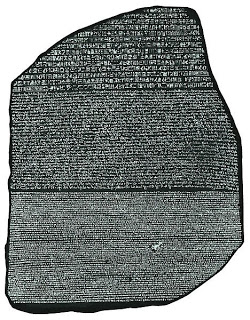Egypt
 Philosophy of Science blog (David Petersen)
Philosophy of Science blog (David Petersen)
- Rashid - A City Rich In History
onislam (Emily Cocke) For most people interested in the history of Egypt, the name Rashid (or as the French named it: Rosetta) is linked to the Rosetta Stone. This stone, which was found in a wall in the fort of the city in 1799, provided the linguist...
- Rosetta Stone Unlocks Egyptian History
Wired.com (Jason B. Jones) 1822: Jean-François Champollion shows a draft translation of the mysterious Rosetta stone and demonstrates to the world how to read the voluminous hieroglyphics left behind by the scribes of ancient Egypt. The story of the...
- Book Review: The Rosetta Stone And The Rebirth Of Ancient Egypt
Bryn Mawr Classical Review John Ray, The Rosetta Stone and the Rebirth of Ancient Egypt. Wonders of the World. Cambridge, MA: Harvard University Press, 2007. Reviewed by Marc Pierce, University of Texas The Rosetta Stone, a stele with an inscription...
- Book Review: John Ray - The Rosetta Stone And The Rebirth Of Ancient Egypt
http://resolutereader.blogspot.com/2007/05/john-ray-rosetta-stone-and-rebirth-of.html "John Ray takes us through how they worked out the meaning of the words – first translating the ancient Greek, then gradually associating the different Hieroglyphics...
- Review: The Last Man Who Knew Everything - Thomas Young
http://tinyurl.com/2tuv75 (calendarlive.com)"Resistant to artificial barriers and educated in various countries, Young became one of the first truly international scientists, corresponding with experts from all over the world. . . . The best part of the...
Egypt
Anniversary of the discovery of the Rosetta Stone
 Philosophy of Science blog (David Petersen)
Philosophy of Science blog (David Petersen)Thanks very much to David for letting me know that I had missed the anniversary of the discovery of the Rosetta Stone on 19th July :-) Never mind. Have a look at David's blog above for a summary of its discovery and significance. Here's an extract:
Today, 210 years ago the Rosetta Stone [196 BC] was discovered and Thomas Young and Jean-François Champollion around 1822 began to decipher ancient Egyptian hieroglyphs based on comparative adjacent languages of Egyptian Demotic and classical Greek.
The Writer's Almanac
It was on this day in 1799 that French soldiers discovered a slab of rock — about 4 feet high and 2 and half feet wide, 11 inches thick and weighing 1,700 pounds, and containing some writing in three different languages — at a port town on Egypt's Mediterranean Coast.
What they found was the Rosetta Stone, and the three scripts were ancient Greek, demotic, and hieroglyphics. Scholars could read and understand the ancient Greek. The second script, demotic, was an Egyptian language that was spoken and written at the time that the Rosetta Stone was carved in 196 B.C. It shared similarities with Coptic Egyptian, which was spoken widely until the 17th century A.D. (not so long before the discovery of the Rosetta Stone), had a strong literary tradition, and used an adapted Greek alphabet for writing — all things that proved useful in understanding bits and pieces of the Demotic script.
But Egyptian hieroglyphics had been a "dead" language for nearly 2,000 years. All around Egypt there abounded pyramids and temples with thousands of hieroglyphic characters carved into the walls, but no one could figure out what the inscriptions meant.
The Rosetta Stone presented scholars with an opportunity to be able to decipher the hieroglyphic language. It took nearly a quarter century of steady scholarship to solve the puzzle.
You can never get near the thing at the British Museum. It is always surrounded by huge gaggles of tour groups with their tour leaders.
- Rashid - A City Rich In History
onislam (Emily Cocke) For most people interested in the history of Egypt, the name Rashid (or as the French named it: Rosetta) is linked to the Rosetta Stone. This stone, which was found in a wall in the fort of the city in 1799, provided the linguist...
- Rosetta Stone Unlocks Egyptian History
Wired.com (Jason B. Jones) 1822: Jean-François Champollion shows a draft translation of the mysterious Rosetta stone and demonstrates to the world how to read the voluminous hieroglyphics left behind by the scribes of ancient Egypt. The story of the...
- Book Review: The Rosetta Stone And The Rebirth Of Ancient Egypt
Bryn Mawr Classical Review John Ray, The Rosetta Stone and the Rebirth of Ancient Egypt. Wonders of the World. Cambridge, MA: Harvard University Press, 2007. Reviewed by Marc Pierce, University of Texas The Rosetta Stone, a stele with an inscription...
- Book Review: John Ray - The Rosetta Stone And The Rebirth Of Ancient Egypt
http://resolutereader.blogspot.com/2007/05/john-ray-rosetta-stone-and-rebirth-of.html "John Ray takes us through how they worked out the meaning of the words – first translating the ancient Greek, then gradually associating the different Hieroglyphics...
- Review: The Last Man Who Knew Everything - Thomas Young
http://tinyurl.com/2tuv75 (calendarlive.com)"Resistant to artificial barriers and educated in various countries, Young became one of the first truly international scientists, corresponding with experts from all over the world. . . . The best part of the...
